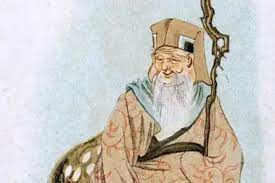Who are the Seven Japanese Gods of Good Luck?
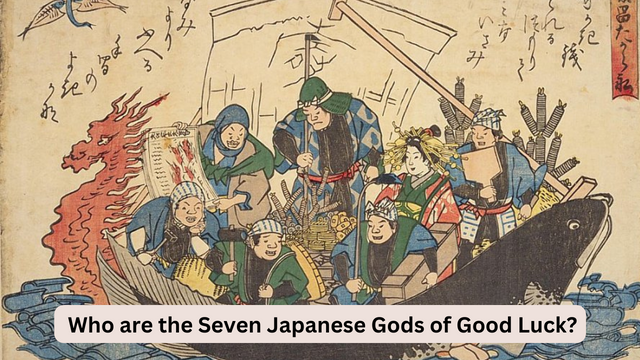
A group of seven popular Japanese deities, the Shichifukujin are associated with good fortune and happiness. The group includes Benten, Bishamon, Daikoku, Ebisu, Fukurokuju, Hotei, and Jurojin. They are of diverse origins that combine Shinto and Buddhist beliefs and have roots in Taoist and Hindu traditions. Of the seven, only Daikoku and Ebisu were originally Shinto deities.

Treasures of 7 deities
Traveling together in the treasure ship Takarabun, the Shichifukujin bring treasures with them through heavenly and human harbors during the first several days of the new year. Treasures include:
- The magic key to the storehouse of the gods
- A raincoat that protects from evil spirits
- The hammer that brings a shower of gold coins
- The wallet that never gets empty
- Roll of expensive fabric
- Gold coin box
- Precious gems and copper coins
- Invisibility cap
Origin in Fushimi
The earliest mention of the seven deities as a group was in 1420 at Fushimi. Since the late Middle Ages, sōhichifukujin has been worshiped in Japan, especially during the first part of the new year. Each deity generally represents good fortune but also carries certain characteristics and associations. Sometimes, the roles of one god overlap with those of others leading to confusion as to which god is the patron of a certain profession.
1. Benten – Goddess of music, arts, and fertility
The only female member of the Shichifukujin, Benten is widely worshiped in Japan. She is one of the most popular deities there. She is the patroness of creative people such as writers, musicians, artists, and geisha. Benten is sometimes referred to as “Benzaiten”, which means goddess of brilliance and eloquence.

2. Bishamon – Warrior God of Shichifukujin
Bishamon is also sometimes called Bishamonten, tamon, or tamon-ten. He is not seen as a Buddha but as a deva (deity). He is the patron of fighters and protector of holy sites and is often depicted as wearing Chinese armor, looking fierce, and carrying a spear and a pagoda. In many images, Bishamon is depicted trampling demons. It symbolizes his victory over evil, in particular, the enemies of Buddhism. As a protector against evil, he is often depicted standing over slain demons with a wheel or ring of fire around their heads, which resembles a halo. However, their main identifying feature is a stupa.
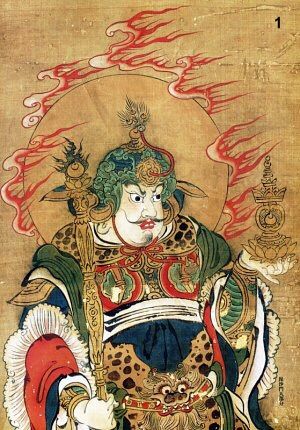
3. Daikoku – The God of Wealth and Commerce
The leader of the Shichifukujin, the Daikoku is the patron of bankers, merchants, farmers, and cooks. Sometimes called Daikokuten, the god is usually depicted wearing a hat and with a wooden hammer, bringing a shower of gold coins called Ryo. The latter is symbolic of the hard work it takes to become rich. He also carries a bag containing valuables and sits on rice bags.

4. Ebisu – God of work
Daikoku’s son, Ebisu is the patron of fishermen and merchants. As a symbol of the wealth of the sea, he is usually depicted as smiling, happy and plump, wearing traditional Heian period clothing, carrying a fishing rod and a large fish – called a tai or sea bream. He is said to be deaf and partially crippled. His worship was most important in the coastal region near Osaka. As one of the shichifukujin, he is said to help merchants find and accumulate wealth. Unsurprisingly, today in Japan it is popular among restaurants and fisheries.

5. Fukurokuju – God of wisdom and longevity
The patron of chess players, Fukurokuzu is the god of wisdom. His name is derived from the Japanese words fuku, Roku, and ju, which mean happiness, wealth, and longevity. He is usually portrayed as a funerary deity, often alongside other shichifukujin like Ebisu, Hotei, and Jūrōjin.
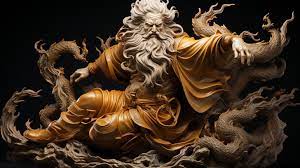
6. Hotei – God of luck and contentment
One of the most popular of Shichifukujin, Hotei is the patron of children and barmen. He is depicted as a fat man with a large belly, holding a large Chinese fan and a cloth bag full of treasure. His name can be translated as a cloth bag. As a god of happiness and laughter, Hotei became the japanese model for the typical Chinese Laughing Buddha. Some also believe that he is an incarnation of Amida Nyorai, the Buddha of Unlimited Light, as he is more concerned about giving and not demanding more.
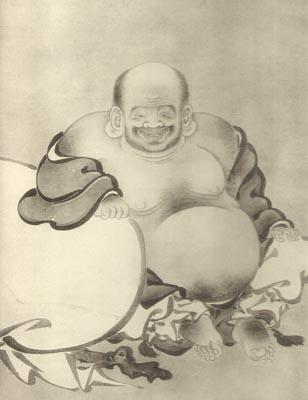
7. Jurojin, Guardian of the Elderly
Jurojin, another god of long life and old age in japanese seven deities of fortune, is the patron of the elderly. He is often depicted as an old man with a white beard, holding a staff with a scroll attached to it. It is said that the secret of eternal life is contained in the book. Often confused with the Fukurokuju, Jūrōjin is depicted wearing a scholar’s hat and having a serious expression at all times. Treasure ship.
